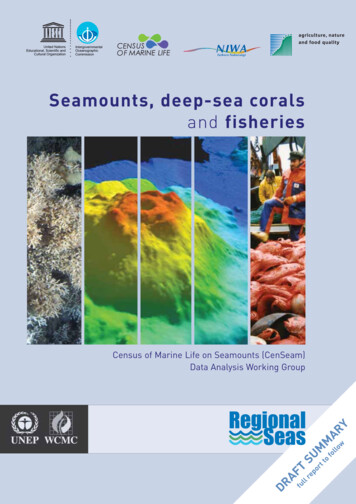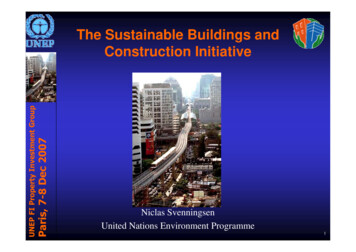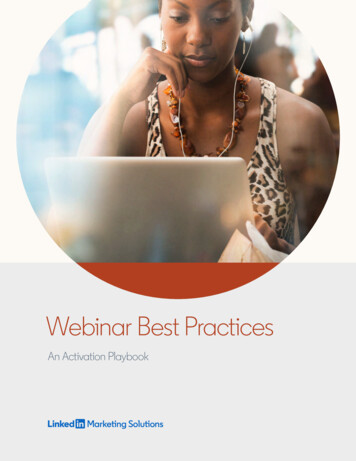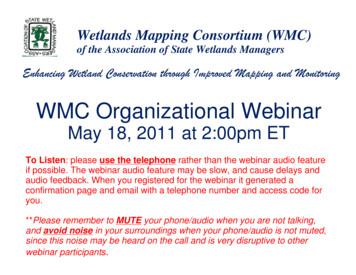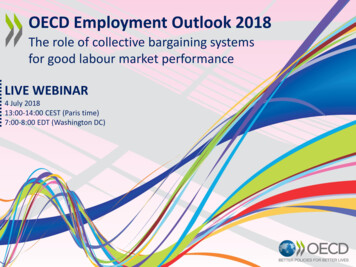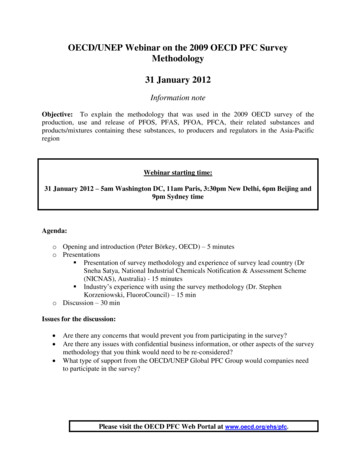
Transcription
OECD/UNEP Webinar on the 2009 OECD PFC SurveyMethodology31 January 2012Information noteObjective: To explain the methodology that was used in the 2009 OECD survey of theproduction, use and release of PFOS, PFAS, PFOA, PFCA, their related substances andproducts/mixtures containing these substances, to producers and regulators in the Asia-PacificregionWebinar starting time:31 January 2012 – 5am Washington DC, 11am Paris, 3:30pm New Delhi, 6pm Beijing and9pm Sydney timeAgenda:o Opening and introduction (Peter Börkey, OECD) – 5 minuteso Presentations Presentation of survey methodology and experience of survey lead country (DrSneha Satya, National Industrial Chemicals Notification & Assessment Scheme(NICNAS), Australia) - 15 minutes Industry’s experience with using the survey methodology (Dr. StephenKorzeniowski, FluoroCouncil) – 15 mino Discussion – 30 minIssues for the discussion: Are there any concerns that would prevent you from participating in the survey?Are there any issues with confidential business information, or other aspects of the surveymethodology that you think would need to be re-considered?What type of support from the OECD/UNEP Global PFC Group would companies needto participate in the survey?Please visit the OECD PFC Web Portal at www.oecd.org/ehs/pfc.
BackgroundResolution II/5 of the International Conference on Chemicals Management (ICCM2) for themanagement of perfluorinated chemicals (PFCs) and transition to safer alternatives invitesgovernments, international organizations, and other stakeholders to consider the development,facilitation and promotion in an open, transparent and inclusive manner of national andinternational stewardship programmes and regulatory approaches to reduce emissions and thecontent of relevant perfluorinated chemicals of concern in products and to work toward globalelimination, where appropriate and technically feasible.The efforts identified by ICCM2 include: information-gathering activities and informationexchange on alternatives; progress in and examples of regulatory actions and voluntaryprogrammes; monitoring; emissions; exposure; environmental fate and transport; and potentialeffects of perfluorinated chemicals and alternatives on human health and the environment.OECD and UNEP are jointly supporting work on PFCs under ICCM2 resolution II/5and haveestablished a Global PFC Group that brings together experts from Governments, the privatesector and NGOs.One of the key activities that is envisioned for this Group is the development and implementationof a survey of the production, use and release of PFCs, building on a similar exercise that wascarried-out in 2009 ocumentpdf/?cote env/jm/mono(2011)1&doclanguage en). The 2009 survey collected information directly from PFC producers, but did onlycover OECD companies. Yet, an increasing share of PFCs is being produced outside of theOECD area.This webinar is meant to explain the survey methodology that was used in 2009 to PFCproducers in the Asia-Pacific region (the methodology is described in the 2009 survey, see linkin previous paragraph) and to solicit feedback on its applicability in this region. Ultimately, theobjective is to gather support from non-OECD producers for this exercise and to develop andimplement a new survey in the course of 2012/13.The webinar will feature speakers from Australia’s National Industrial Chemicals Notificationand Assessment Scheme who led the previous survey (and may also lead the next), as well asrepresentatives of OECD producers who participated in the 2009 survey and who will reportabout their experience with the exercise. These presentations will be followed by a discussion,where participants are invited to provide comments on the survey methodology with the ultimateaim of identifying possible adaptations that would need to be made to the survey methodologyfor its application in the Asia-Pacific region.Please visit the OECD PFC Web Portal at www.oecd.org/ehs/pfc.
Logistical informationWebinar starting time: 31 January 2012 – 5am Washington DC, 11am Paris, 3:30pm NewDelhi, 6pm Beijing and 9pm Sydney timeTo connect to the webinar you need to:1. Register: Please register a few days in advance of the webinar. To register for the .gotomeeting.com/register/639602168. When you register, you will begiven additional information regarding the system requirements and instructions on howto log in to participate the day of the Webinar.2. Participate: To participate you will need a computer with internet access and a phone.On the day and time of the webinar, and ideally 10 minutes before it starts:a. You will need to connect to the internet link above, which will give you access tothe powerpoint slides that will be used by speakers, as well as allowing to posequestions and comments in writing.b. You will also need to call into a conference call facility located in the US in orderto be able to access the audio. The attachment provides toll free and localtelephone numbers for a list of countries. If your country is not covered, you willneed to place a long distance call to the US ( 1 706 758-1822). Once you havedialed the conference call number, you will be asked to key in the followingaccess code: 2025640984#. Please mute your phones when not speaking, so as toensure the best possible audio quality. Should you have any problems withconnecting to the conference call, please email Sarah Jukes at OECD(sarah.jukes@oecd.org).Please note that the powerpoint presentations for the webinar will be made available online onthe OECD PFC en 21571361 44787844 44799777 1 1 1 1,00.html), so in case you cannot connect to the webinar internet facility, you could still access the slidesthere.System Requirements:PC-based attendeesRequired: Windows(r) 7, Vista, XP or 2003 ServerMacintosh(r)-based attendeesRequired: Mac OS X 10.5 or newerPlease visit the OECD PFC Web Portal at www.oecd.org/ehs/pfc.
Reservationless-Plus Toll-Free Dial-In Number (USA): 8662993188Reservationless-Plus International Dial-In Number: (706) 758-1822Conference Access Code: 2025640984#International Toll-Free Dial-In rnational local ll-freeInternational local nternational local (toll)CHINA4006929683All CitiesDomestic8008700152All CitiesCOSTA 32713518LocationToll-freeInternational local 804246LocationToll-freeInternational local MANYPlease visit the OECD PFC Web Portal at www.oecd.org/ehs/pfc.
GREECE00800128858LocationToll-freeInternational local (toll)Hong l local (toll)HONG ionToll-freeInternational local ternational local onal local (toll)Rotterdam080002259280107114884NEW 01511622310517LocationToll-freeInternational local oll-freeInternational local (toll)Singapore8001011514066221133SOUTH 6SWEDENStockholmSWITZERLANDPlease visit the OECD PFC Web Portal at www.oecd.org/ehs/pfc.
5LocationToll-freeInternational local nal local (toll)0808234843002031070290UNITED KINGDOMLondonPlease visit the OECD PFC Web Portal at www.oecd.org/ehs/pfc.
You will also need to call into a conference call facility located in the US in order to be able to access the audio. The attachment provides toll free and local . Reservationless-Plus Toll-Free Dial-In Number (USA): 8662993188 Reservationless-Plus International Dial-In Number: (706) 758-1822 Conference Access Code: 2025640984#
